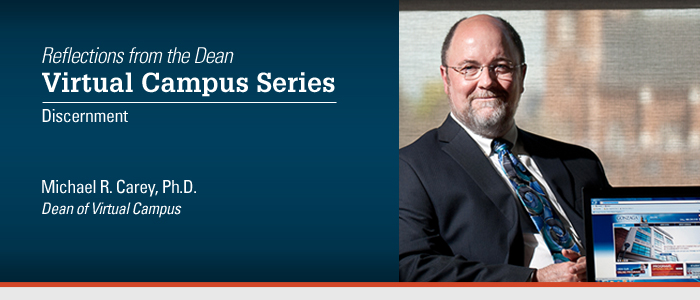Previously I talked about how the Virtual Campus was created to make sure that Gonzaga’s transformative learning experience was available to graduate students wherever they are. Accomplishing this goal requires a focus on the learning experience itself, separate from face-to-face or distance modalities. The innovation that such a focus allows is grounded in three Ignatian dynamics: Indifference, Discernment, and Adaptation.
Indifference—or holding loosely what has been done in the past—is the first step, but it must lead to Discernment. For Ignatius of Loyola, Discernment is a decision-making process that is grounded in the person becoming as perfect an instrument of God’s will as he or she can be. Discernment was a critical dynamic for Ignatius, for he understood from his own experience how often one can misrepresent what his or her own will prefers over what God’s will is for the situation. Clearly, no one can know God’s will perfectly—nor can we even know what is absolutely the best decision—but effective discernment builds upon an attitude of openness to see more clearly what is at stake in our decisions, as well as how our pre-judgments and bias can derail the process of choosing what is best.
In the Virtual Campus, Discernment takes the form of an analysis of the needs of distance students, or students who study abroad, or alumni, parents, and friends of the university who want to stay connected. Discernment also involves identifying the essential from the incidental: for example, the value of learning experience at Gonzaga is not limited to a face-to-face interaction in a physical classroom on the Spokane campus, but rather to the quality of the interaction among learners, whether online or on-campus. My own experience of teaching an online course helped me to understand that asynchronous discussion boards allow both extroverted and introverted learners to participate equally in the essential dialogue around the subject. That understanding was about an essential value of dialogue, and so I began to look for more ways to equalize the “playing field” between extroverts and introverts in my face-to-face classroom experiences.
Understanding what are the essential values at stake in the learning experience, and knowing what are the needs of learners and the technology available to meet those needs, all leads to the final dynamic of Adaptation, as important to Ignatius and the early Jesuit nearly 500 years ago as it is to the Virtual Campus and Gonzaga University today. I will share some thoughts on Adaptation in my next presentation.

